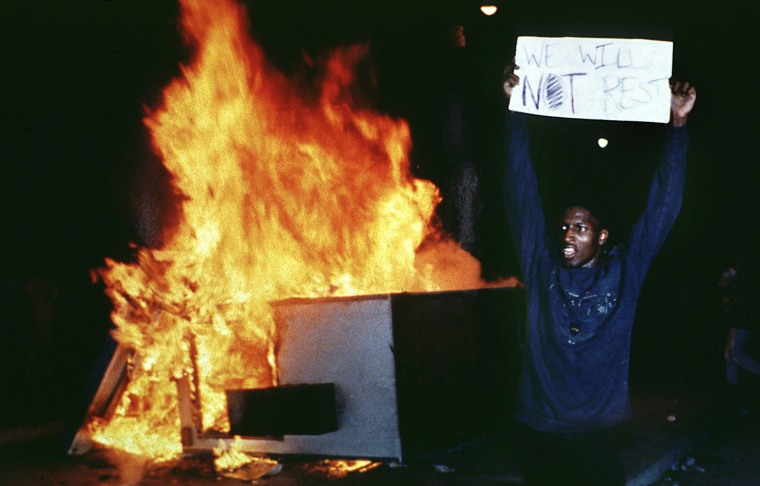Whatever horror I felt watching the March 1991 tape of Los Angeles Police officers fracturing Rodney King’s skull, breaking his teeth and bones and causing him permanent brain damage was partially offset by a sense of relief: A witness with a camcorder had caught the brutality on tape. The officers couldn’t deny what they’d done, and, thus, my 15-year-old self reasoned, a jury would quickly convict them of excessive use of force and a judge would send them away.
The officers couldn’t deny what they’d done, and, thus, my 15-year-old self reasoned, a jury would quickly convict them.
But 30 years ago, that Los Angeles jury acquitted Officers Theodore J. Briseno, Laurence Powell and Timothy E. Wind, and Sgt. Stacey C. Koon, and made me feel foolish for having believed that attacks on Black people would be taken more seriously than they had been when my parents were teenagers.
Whether it was the case of the Scottsboro Boys for my grandparents, the lynching of Emmett Till for my parents’ generation or, for the Black people behind me, acquittals following the killings of Amadou Diallo or Trayvon Martin, every generation of Black folks seems to have at least one moment when its already fragile faith in the courts is dashed against the rocks of American racism.
For my generation, one such moment occurred on April 29, 1992.
It goes without saying that the Black Angelenos who stormed the streets were angry at the accused police and at a jury tolerant of their brutality. But there must have been some angry at themselves for having allowed themselves to believe that the tape would matter and that justice could not possibly be denied them this time. But it was denied, the same way it had been denied to the generation of Black Los Angelenos that had set Watts on fire 27 years earlier.
It’s important to remember the acquittal of the officers who beat up King as the second of two successive slaps to the face of Black Los Angeles. In November 1991, a judge had perversely used the language of racial healing to justify probation, and not prison for a Korean store owner who shot a Black child in the back of her head. That store owner, Soon Ja Du, had accosted and falsely accused 15-year-old Latasha Harlins of planning to steal a $1.79 bottle of orange juice when the teenager had two singles in her hand to pay for it. A jury convicted her of voluntary manslaughter, which had a maximum sentence of 16 years. A higher court upheld the judge’s decision to give Du probation. The next week, the police who’d been caught beating King walked free.
In a 1993 interview with PBS’s Charlie Rose, novelist and sage Toni Morrison described what she called Black Angelenos’ “amazing” patience. “What struck me most about the people who went burning down shops and stealing,” Morrison said, “was how long they waited. The restraint. Not the spontaneity, the restraint. Do you realize the moment to be anarchic was when we saw those tapes, when we first saw those tapes. … They waited for justice … and it didn’t come.” And then, as if to emphasize her point, she repeated, “They waited.”
In a real sense, the waiting continues. While there have been some recent examples of police officers being convicted and sent to prison for killing Black people, the rarity of it brings to mind a retort from one of Morrison’s 19th-century characters who’s told by another Black woman that some white people treat Black people fairly. She says, “And every time it’s a surprise, ain’t it?”
It’s important to remember the acquittal of the officers who beat up King as the second of two successive slaps to the face of Black Los Angeles.
The footage of then Minneapolis Police Officer Derek Chauvin keeping his knee on George Floyd’s neck for more than nine minutes, footage of North Charleston, S.C., Officer Michael Slager carefully taking aim at Walter Scott’s back before felling him like game; footage of then Chicago Police Officer Jason Van Dyke shooting teenager LaQuan McDonald 16 times; footage of Gregory McMichael, his son Travis McMichael, and William Bryan chasing down Ahmaud Arbery and killing him didn’t leave Black people feeling confident they’d be convicted.
Each felt like a surprise, if only because the deaths of Sandra Bland, Eric Garner, Tamir Rice, Breonna Taylor and John Crawford III were never vindicated. Consequently, for Black people, confidence that the courts will dispense justice feels no less foolish than it did 30 years ago.
On May 9, jury selection begins for Aaron Dean, the white former Fort Worth police officer accused of killing Atatiana Jefferson, a Black woman who came to her window when she heard Dean in her yard sometime after 2 a.m. The officer was investigating a neighbor’s report of Jefferson’s door being open, but he did not, officials say, identify himself as police when the 28-year-old appeared at her window armed. Within seconds, his body cam footage shows, Dean had fired through Jefferson’s window. You would think that jurors in a state that reveres guns as much as Texas does would send a clear and resounding message that Dean committed a horrible crime when he killed Jefferson.
But none should be foolish enough to actually count on a conviction. The Rodney King case showed that some proof doesn’t prove anything to the members of a jury.


